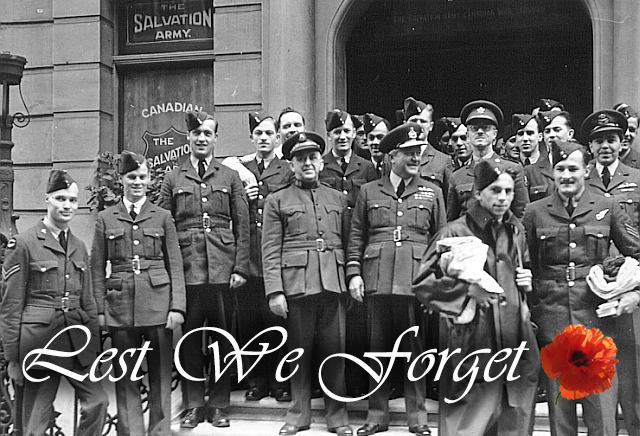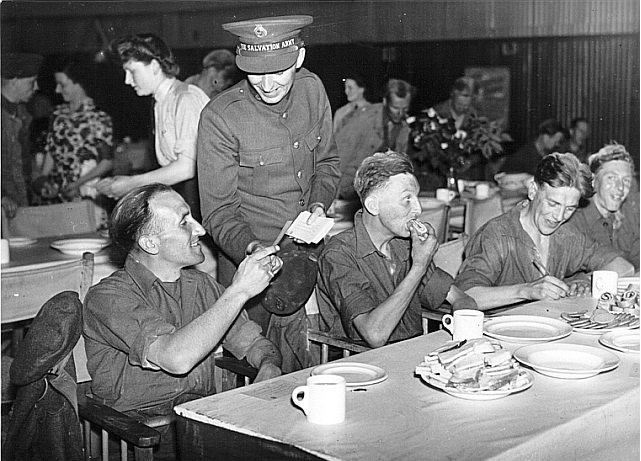Remembering our Heroes (Part 2)

For many residents at The Salvation Army’s Meighen Health Centre in Downtown Toronto, Remembrance Day holds a special place in their heart. Revisiting memories of the war can be hard and emotional. Lieutenant-Colonel David Hammond remembers soldiers who were excited to face the war but returned back home forever changed. For Major Caroline Braddock, memories of the wars have given her a different perspective in her role as a Chaplin at the Meighen Health Centre.
Recently, writer Richard Todd visited Lieutenant-Colonel David Hammond and Major Caroline Braddock at the Meighen Health Centre. Here are their stores.
Lieutenant-Colonel David Hammond (Ret.)
 In the early 1940s, Nelson, British Columbia was an idyllic place for a young boy to grow up. With so much to do, such as swimming in the lake, fishing, or mountain climbing, the local children were somewhat shielded from the war raging in Europe at the time.
In the early 1940s, Nelson, British Columbia was an idyllic place for a young boy to grow up. With so much to do, such as swimming in the lake, fishing, or mountain climbing, the local children were somewhat shielded from the war raging in Europe at the time.
However, as joyous as those years in Nelson were for Salvation Army Lieutenant-Colonel David Hammond (Ret.), the contrast between the young men who left and those who returned is seared into his memory.
“I was nine when the war started,” he says. “I remember seeing the soldiers leaving. All of those fresh-faced boys were eager to go on this exciting adventure. But many of those who returned were forever changed both physically and emotionally.”
“Emotions were very high in school,” he says. “One day, our teacher put our lessons aside for the day so we could just talk about the war. Some of the children were really broken because their fathers weren’t coming home.”
Mr. Hammond studied and memorized the classic wartime poem In Flanders Fields, which helped give him perspective on the sacrifices those young men made so many years ago.
“When learning the poem,” he says. “I had a moment when I thought about the thousands upon thousands of men who went over to Europe and now lie in Flanders Fields. When I think about everything I’ve accomplished in my life that those brave men never did, I get an enormous feeling of gratitude.”
Major Caroline Braddock
 Although born after World War II ended, Major Caroline Braddock remembers Gordon Moulton, an uncle she only knew through stories from her mother.
Although born after World War II ended, Major Caroline Braddock remembers Gordon Moulton, an uncle she only knew through stories from her mother.
“He was only in his early 20s,” she says. “News that he wasn’t coming home from Europe was devastating for my family, especially my grandmother. She found it difficult to cope, and so it fell to my mother, who was the oldest child, to help raise the rest of the family. It was difficult for her because she was also grieving herself.”
As a chaplain at The Salvation Army Meighen Health Centre, Major Braddock helps residents come to terms with how their lives were affected by the war. At this time of year, the subject comes up more often.
Through engaging with the residents, Major Braddock has developed a deeper understanding of what made young men like her uncle sign up to fight in a war thousands of miles away.
“People made those sacrifices for many reasons,” she says. “But I believe that the core of it was a love of freedom and country, and the sense of duty to protect both for themselves and for future generations.”
Today, she continues to provide help and support to the residents of the Meighen Health Centre, a role she carries out with daily gratitude.
“I enjoy my work here very much,” she says. “It’s an honour to have people trust me with the most crucial moments in their life, and carry their stories and memories in my heart.”
Click here to read Part 1 of Remembering our Heroes.
*Interviews conducted by Richard Todd
*Stories written by Richard Todd


